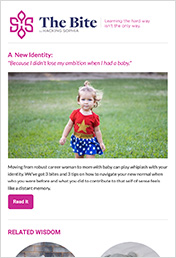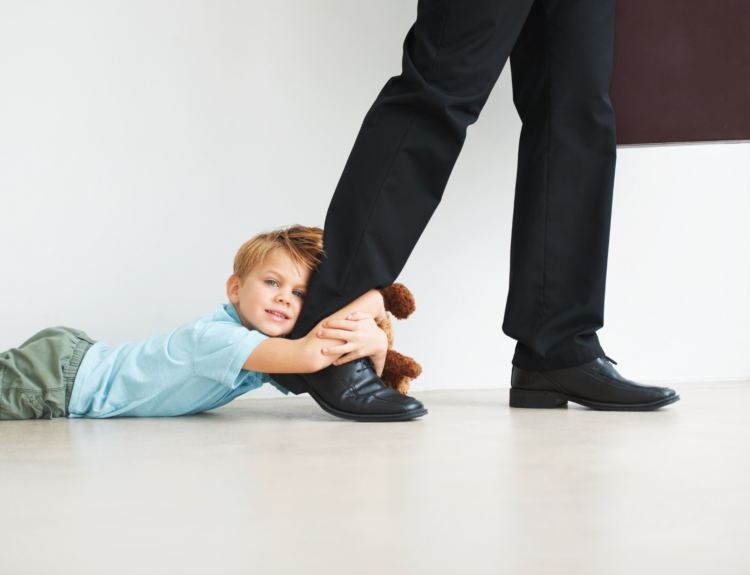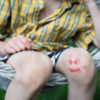Whose separation anxiety is it anyway?
We can’t wait to regain our own separate space and yet we’re worried about how they’ll do (and how we’ll do). Our kids had the security of our constant presence for over a year, but they need to move back into the world. As we transition into more structured situations – camp, offices and school – a lot of parents and kiddos alike are experiencing separation anxiety. We tapped Emma Fogel, pediatric social worker, to share her wisdom on how we can equip our kids, and ourselves, for successful separations.
I have kids who are perfectly well-adjusted in the house who are struggling when they see their friends at the park. Usually you’d wonder what’s wrong with their social skills. This actually reflects a family’s establishment of safety processes in the house and a child’s obedience. Recognize that in your child and know that’s okay. It actually means you’ve done a great job. Emma Fogel, Pediatric Social Worker
What To Do (Bites)
-
They need new growth opportunities and the security to know it’s ok
We know it’s really important for kids to be around other people. They benefit from socio-emotional connections (beyond their parents or siblings) and new opportunities for problem solving, communication with kids and adults outside of their family and the growth and confidence that comes from navigating new and different situations. When you’re feeling uncertain or maybe anxious, remember this.
For kids, after months and months of experiencing that safety is inside the home with their family, it’s created an understanding that parents are the only safe people around. Think about it this way: if they are worried about being around others or leaving you – that means you did a good job – you’ve built a world within the house where they feel safe and comfortable. But we’ve got to start shifting the messaging and the understanding that they will be safe. That others outside of the house are safe.
-
Rely on facts – for yourself and for them
Don’t avoid the conversation, talk about it. But to shift their perspective around what’s safe, focus on the facts. You can share that we now have medicines that can protect us against the virus. If you have had a vaccine, let them know it makes you feel safe and comfortable, and maybe they’ll get one too one day. Share the fact that typically kids don’t get that sick from the virus.
The same is true for you. Facts can help you cope with your own anxiety or sadness of separation, which stems from feeling out of control. If you are super anxious at drop off, it will amplify your child’s response. So you can minimize your own emotional reaction by focusing on what you know – you chose this school/daycare/camp because you feel confident in the staff and you want your child to be socialized. Remind yourself that you need time to do your own thing for work, respite, etc. Reread Bite 1. Your kids grow through others and through new experiences. They benefit from being out of the home.
-
Create a coping plan with them
Separation can be tough. It’s fair to expect big emotions of fear, sadness and anger will come. It’s helpful to have a plan in place for when those emotions pop up. Help them think through what they can do when they’re scared, sad or overwhelmed. Distraction is key. Perhaps they can read a favorite book, bead if they find that soothing, hug a comforting toy or stuffed animal. Discuss some things they can say to themselves to calm down like, “I can do this,” or “Mom and/or Dad are safe, I’ll see them soon.”
For little ones, encourage them to use deep breathing to calm themselves down, putting one hand on their belly and one hand on their chest and imagining breathing in the smell of their favorite food and then blowing out through their mouth, as if the food was “too hot”. The plan should include the reassurance that mom and/or dad believe that school, camp, a friend’s house and work are safe, and that they will see you at the end of the day.
When transitioning a kid off of a parent and knowing that there will be withdrawal, that comes from anxiety, which is due to a lack of predictability and control. Kids will be upset – that’s unavoidable. It’s about instilling in them that they can manage their emotions without a parent. Emma Fogel, Pediatric Social Worker
Tips
-
Talk about their feelings – before and after. A lot of parents are afraid to engage in conversations with their kids for fear of upsetting them. But they need to talk it though with you and if you avoid those conversations, it’ll only increase the behavioral and emotional response. Talk to them about what it will feel like to be away from you, how it’ll be to be at camp all day. Ask them “how will you feel if you’re at [grandma’s house] without me?”
They may also have a fear about getting sick. It’s not unreasonable that they’ve picked up the fear of the virus. Ask: How do you think you’d feel if you got exposed to the virus? What do you think would happen? Go through the scenario step by step… “Yes, if you got the virus, you might have a stuffy nose, how would that feel? Have you ever had a stuffy nose?”
And the same goes for after an anxiety-filled experience. E.g. let’s say he got scared because someone touched his wrist. You’re providing an opportunity for him to get it off his chest and a chance for you to clarify with facts and let him know that was okay. If your child isn’t quick to spill, you can try asking: “what were 3 awesome things you did that day?” or “did you have any times today when you felt nervous?”
*Bedtime is not a great time for these conversations –it’s a time for relaxation and reflection so exploring worries and stressors would escalate the child’s emotions when we are trying to relax them. Try addressing these while on a walk, in the car, in a low-pressure situation.*
-
Start small to build confidence. Start giving them exposure to being away from you. It helps to start near-in and small, as in have them spend time with adults they know for small windows (a morning at grandma’s) before dropping them off for the day at a brand-new camp. Be sure to acknowledge successes, e.g. “Wow, you spent the morning at your grandparents, that was amazing!”
-
It’s tempting, but whatever you do, don’t pick them up. Chances are you’ll hear your kid is upset and you’ll want to swoop in and comfort them. “The number one piece I share with parents is don’t avoid the one thing that makes your child or you anxious.” Right now, your child is reunderstanding the world, which is challenging. As a parent you are letting them know that work and school and camp are safe. If you pick up your child because they’re upset, you’re reinforcing that it’s not safe. It triggers a fear response and a neural connection that says “my grandparents’ house isn’t safe” or “camp is dangerous”.
It won’t be easy – there may be a lot of crying. They might not have a great sleep at their grandparents, or they may not want to participate in soccer but it’s the long-term exposure where you’re showing through a lack of avoidance that you trust that your child is in a safe place. If your child asks explicitly, “if I don’t like it will you come get me?” You can let him or her know, “Mommy will get you at the end of the day and if you’re feeling unsure, remember your [see calming words or activities in Bite 3 above].”
Warning Signs:
As much as we are encouraging children to experience stress and separation, it’s important to recognize when they might be outside of their realm of coping. The question is: can they transition between emotional states easily? It’s safe to say after being home for 15 months, if they have a bad night at grandparents, a morning of crying at camp, even a few days of sadness at camp, that’s a normal transition.
But if at the end of the day they’re still crying, sad, angry, aren’t joining in on activities you know they love, can’t fall asleep, don’t want to eat, or if you see them performing rituals –obsessive practices to make them feel in control and safe (e.g. excessive hand washing, obsessing over texture of pajamas) this may indicate your child is struggling with rigidity. Communicate to grandparents, camp, teachers, that your child is having a difficult time. If this continues for two weeks (or in the case of visits to grandparents or friends, if there are multiple experiences) where they don’t adjust, that indicates a child is struggling and would require outside professional support to increase coping strategies.
About our Expert:
Emma Fogel is a Registered Social Worker with a Master of Social Work from the University of Toronto. She has a private practice in Toronto. Emma is a Cognitive Behavioural Therapist, with additional certifications in Generalized Anxiety Disorder, Obsessive Compulsive Disorder, Post-Traumatic Stress Disorder and pediatric grief.
In addition to her clinical work with individuals, youth and families, Emma provides mental health-informed trainings and webinars for educational, recreational and corporate groups throughout Ontario.
For more information on Emma and her services, please visit her website here.




